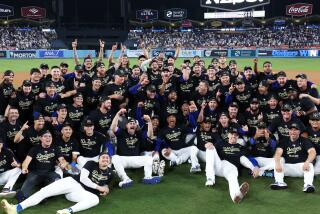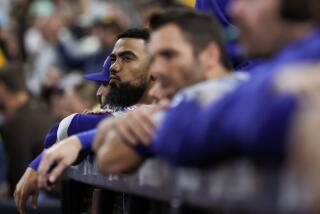Cellar-Dwelling Season Proves Emotional Time : Four Padres of ’87 Respond Differently to Being Down and Out in the NL West
- Share via
SAN DIEGO — The Padres’ 1987 season cannot be recalled through statistics. After the club started 12-42, statistics were meaningless.
It cannot be recalled through specific games or strategy. After the season was five days old, the game was to get out of last place, and the strategy was to do it any way they could.
On April 10, the Padres were in sixth place. On Oct. 4, they were in sixth place. For only one night during that six-month stretch were they not in sixth place, and even then, it was a tie for fifth. Then they lost 12 of their last 14 games.
A season like this, then, is best recounted through emotions. The anger over the poor start. The hope, after the June 4 nadir (when the Padres were 12-42) for a better finish. The delight of late-season victories over contenders and impending respectability. The pain of realizing that, even by playing near .500 baseball for the season’s final four months, things would end no differently.
It was a season of emotions, the kind which can best be told through voices. Not the singular harsh tone of Manager Larry Bowa, but through four players, each important to the team, but each of whom saw the six months from his own, different bunker.
DELIGHT
Pitcher Mark Davis joined the Padres July 4 in a seven-player deal with the San Francisco Giants that also brought Keith Comstock, Mark Grant and Chris Brown to San Diego for Dave Dravecky, Craig Lefferts and Kevin Mitchell. Davis brought with him a 4-5 record, 4.35 ERA and nearly an equal number of starts (11) as relief appearances (9). He and his career had reached a confusing low.
Bowa made him the top left-hander out of the bullpen. He promised to keep him there. Davis became the club’s top relief pitcher. He finished the season with 25 splendid games, allowing 9 earned runs in 38 innings for a 2.10 ERA. He thinks he has finally found a bit of heaven.
“I get back to my hotel in Chicago late one Saturday night and this guy named Doc (John Mattei, Padre traveling secretary) called me and started talking about plane reservations to join the Padres in Montreal. Suddenly it hit me. I hung up the phone and looked over at my wife and shouted, ‘Honey, we’ve been traded, we’ve been traded.’ I was so happy, even though I hadn’t heard it for sure yet.
“I go down to Al Rosen’s (Giants’ general manager) room and he tells me officially and I’m so happy, I can’t believe it.
“My career looks so much better here. And the weather, you wouldn’t believe what it was like to play in Candlestick Park every day. “Here . . . the weather is so nice, I feel like I can come in and pitch without ever warming up. And here, the manager has confidence in me and keeps using me even when I’ve had bad outings. I remember after one terrible time in my first week here (allowed two walks and two hits to four batters in Pittsburgh), the very next day Larry called me in the game. He told me to throw whatever I thought I could get the batter out with. He told me I would be on the mound whether I got guys out or not. What a great feeling. I didn’t allow a hit and got a save.
“I decided I don’t want to be traded ever again. I want to spend the rest of my career here.”
ANGER
John Kruk entered his second big league season with 4 career homers, 38 RBIs and an uncertainty as to whether he was a left fielder or first baseman. He exited the season with 24 career homers, 129 career RBIs and a starting job at first. One August night in Atlanta, he hit two three-run homers and drove in seven runs, the beginning of a month in which he knocked in a club-record 30 runs. He also batted .314, good enough for fourth in the National League. A good season, you’d think. Except he ended it by hitting .235 in September, with just 2 homers and 12 RBIs. And he realized something. Everything he accomplished was tainted by losing.
“It was a bad, bad, terrible year. It don’t matter what I did,” Kruk said. “Nothing matters, when you are losing like this. I could hit .400 and this season would still leave a bad taste in my mouth.
“They say we started out slow because of all our young guys. I don’t care. We still lost. I don’t care who it was with. If we are embarrassed, good, because we should be. “I still need a lot of work. I can help this team more than I did. I strike out too much (second highest on team with 93). I’m not driving in key runs. I don’t feel like I did enough when we needed me most.
“And I’ve got to work on improving at first base. That’s what they told me, that I should concentrate on first. So I am. I’m going home (Keyser, W. Va.) for a couple of weeks to see my family, and then I’m coming back here and working every day on first base. Of course, I know they are looking for a power hitter and a lot of power hitters are first basemen, so I have kept my left-fielder’s glove. I’ll play wherever they want. Who am I to complain? I ain’t been around long enough.
“But I know this: If you’re happy with this season, then something is wrong. It’s the team that counts. Least, that’s how I always looked at it.”
HOPE
On July 7 in Chicago, in the summer’s most turbulent moment, pitcher Eric Show hit Cub star Andre Dawson in the face with a fastball. As bad as the pitch may have been, nothing was worse than its timing. Dawson had homered three times in his last five at-bats against the Padres. Dawson went down, the field was covered with fights, the 26,615 fans at Wrigley erupted in cries for revenge, and Show was forced to leave the game for safety reasons.
A month later, the shaken pitcher had fallen to 6-12 with a 4.22 ERA. Then, Show figured out what he was doing wrong mechanically. In his final eight starts, he went 2-4 with a 2.89 ERA. He once was dying to be traded; now he can’t wait for next season.
“This year wasn’t a total loss, not for me. For my last (eight) games, I have thrown the ball just as I wanted to throw it. I have discovered something I will never lose. I know how to harness my mechanics.
“I have studied and figured out everything I was doing wrong. I have written all of this down too. After every start, I wrote down just what I did, right here in this diary. I will never forget it. I will refer to it next season, whenever I need help.
“My search has ended. I know it has. Now, I know that when I go astray, it will only be a detour. I will not go off the path for good ever again.
“One thing for sure: The way this season has ended, I know from now on, it will take something really freaky to beat me.”
PAIN
Tim Flannery started the season--his seventh as a Padre infielder/folk hero--as a backup to rookie second baseman Joey Cora. On June 8, Cora was sent to Triple-A after hitting just .234 and commiting 9 errors in 51 games. The job was returned, as it is usually every year, to old, reliable Flannery. Except this time, Flannery wasn’t physically ready. Torn ligaments in his ankle had sidelined him from May 5-31. He hurt, but he still played, and finally in August the pain got to him. He went through an 0-for-29 slump, the worst of his career. His pinch-hit groundout Sunday gave him an .051 average in the season’s final month, dropping his season mark to a career-low .228. And in the end he was back on the bench, used only as a last resort. He wonders if he’ll ever try to give that much of himself again.
“This is the worst I’ve ever felt about the end of the season, ever. I’m going to completely forget about it, or at least try to forget about it. Maybe later on I’ll see the good in it. It’s just very hard for me right now.
“They told me Joey was going down and asked me if I could be ready and I said sure. They needed me, and I was there. I played hurt, just like I always do. But it wasn’t smart. It didn’t pay off. I did poorly, and then I know everyone upstairs was saying, ‘He just can’t do what he used to do.’ Of course I couldn’t, not on a bad ankle. I’m not so sure they didn’t forget how hurt I was. I gave everything, and didn’t feel like I got a lot in return.
“I went to my doctor the other day and he looked at my ankle (still badly swollen) and said, ‘What happened to you?’ I said, ‘Doc, I decided to play on it.’ And what happens? The season ends and all anybody knows is, here is a guy who just hit .230.
“In one breath: I’d never do it again. It seems sometimes that guys who only play when healthy are given more opportunities than guys like me. Then I think about it and, of course, I’d do it again. It’s just my nature.
“And really, I don’t ask for much. Maybe just a ‘Thanks for trying.’ ”
More to Read
Go beyond the scoreboard
Get the latest on L.A.'s teams in the daily Sports Report newsletter.
You may occasionally receive promotional content from the Los Angeles Times.











